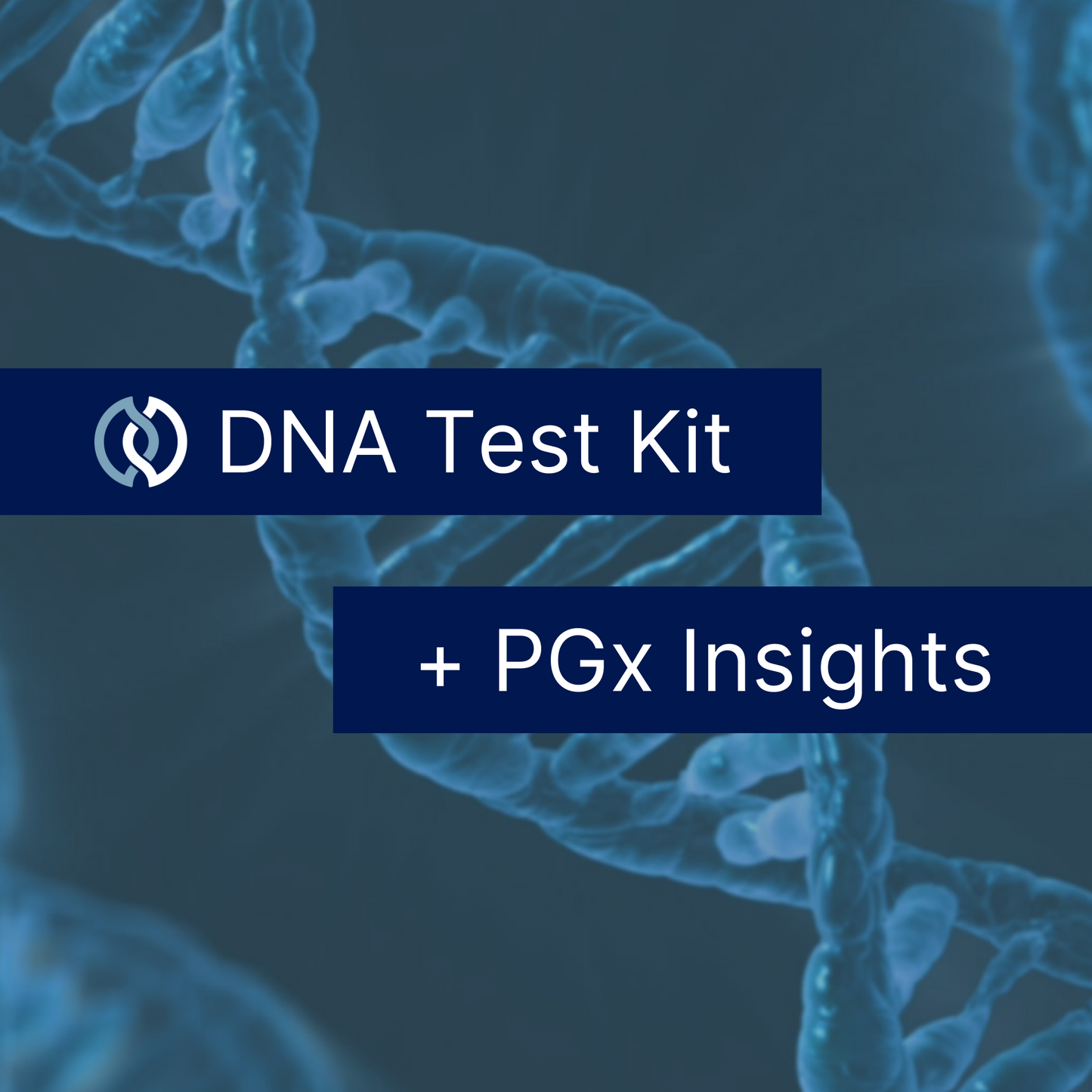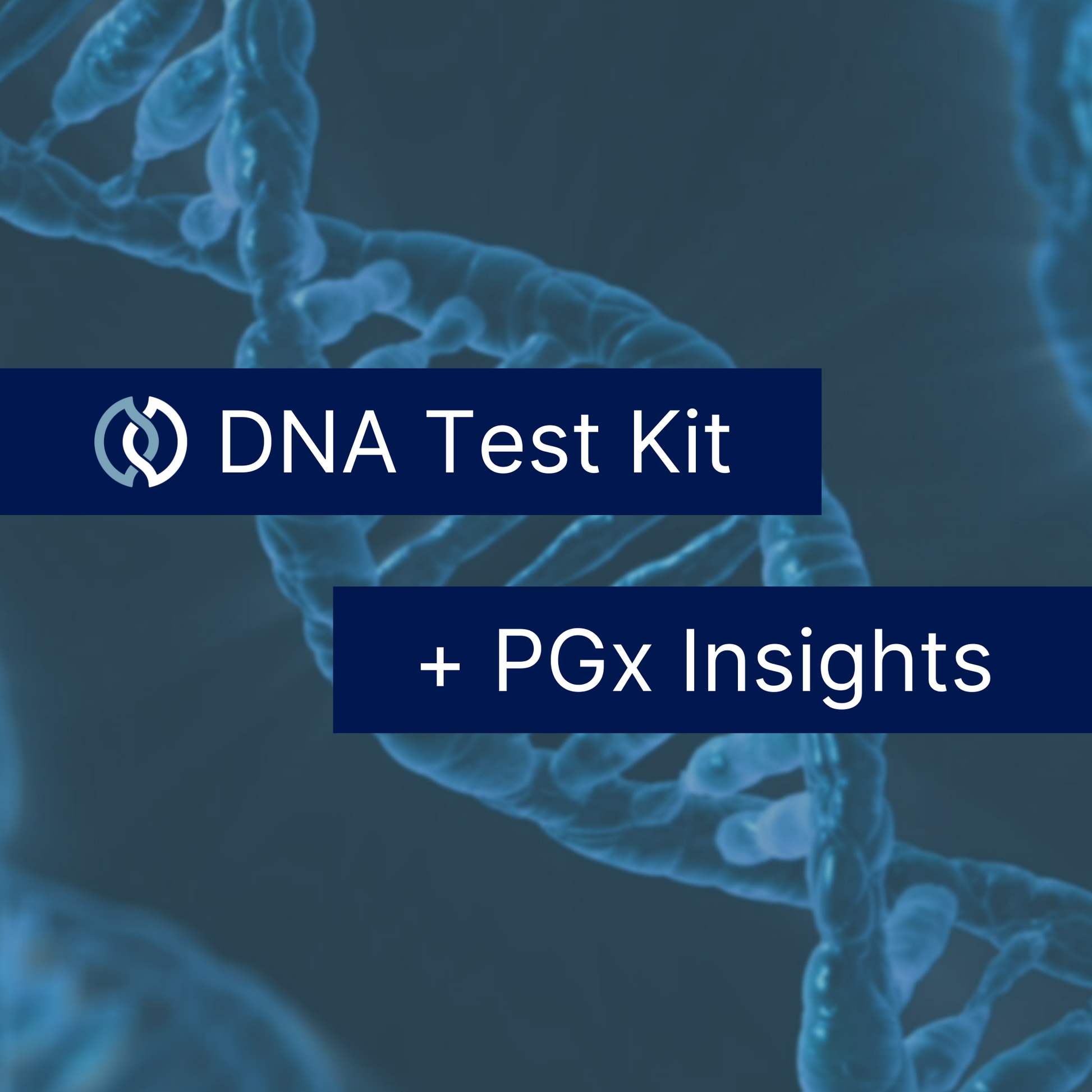Your DNA holds the key to better health—unlock it today.
A simple cheek swab is all it takes to begin uncovering the insights hidden in your DNA. We analyze 750,000 genetic markers and apply advanced technology to expand this data to over 200 million genetic variants with an accuracy rate of 99.7%. This innovative approach provides insights 100x more detailed than standard DNA tests, helping you make informed decisions about your health, wellness, and medication options.
Check Genetics
DNA Test Kit + PGx Insights
Share


Enjoy Our Advanced Online Portal Free for One Year!
Unlock the power of personalized health with complimentary access to the Check Genetics online portal. Included free for one year with your DNA Test Kit + PGx purchase, the portal provides tailored health insights based on your unique genetic profile. Dive into over 650 detailed reports covering nutrition, fitness, mental health, and more, all designed to help you make informed decisions about your well-being. From actionable lifestyle recommendations to an AI-driven health coach available 24/7, the portal offers everything you need to proactively optimize your health.
Take your wellness journey to the next level with features like our Lab Test Analyzer, which integrates your lab results with your DNA data for deeper insights and progress tracking. Your data is kept private and secure, ensuring peace of mind as you explore the possibilities of precision health. This is your opportunity to take control of your wellness with science-backed insights, all at no additional cost for the first year.
Features That Empower Your Health Journey
-
Genetic Explorer App
An interactive platform allowing users to explore their genetic data in detail. Users can learn about specific genes, their functions, and associated health implications.
-
Personalized Health Reports
The platform generates comprehensive reports, including pharmacogenomic insights, polygenic risk scores, and insights into non-health-related traits.
-
Lifestyle Recommendations
Our program provides personalized recommendations on foods, exercise, medications, and supplements, all tailored to an individual's unique genetic profile.
-
AI Health Chatbot
An AI-driven chatbot that provides real-time assistance, answering user questions about their genetic data, reports, and health recommendations.
-
Blood Test and Labs Tracking
Users can upload their blood test results from various labs, which are stored, tracked, and provide useful insights.
-
Privacy and Security
Our platform uses HIPAA-compliant protocols, GDPR-aligned practices, and advanced encryption to ensure your genetic and personal information is safe and secure.
Frequently Asked Questions
Can I do a bulk order for my organization?
Yes, please send a message to info@checkgenetics.com that details the organization you work for, the best way to contact you, how many test kits you want and when you need the test kits by.
How much is the online portal after my free first year?
You can subscribe to our online portal for $200/year.
How is the testing done?
Check Genetics offers state-of-the-art buccal (cheek) swab DNA test kits. These advanced kits are designed for superior accuracy and convenience, featuring sterile, soft-tip swabs that effortlessly collect DNA-rich cells from the inner lining of your cheek.
The swab collection method is not only highly reliable but also non-invasive, making it an innovative solution for DNA testing. Whether at home or on the go, Check Genetics ensures a seamless and comfortable experience while delivering precise results.
What type of DNA testing is done?
At Check Genetics, we use a DNA testing method called genotyping, a fast and reliable way to identify genetic variations in your DNA. Rather than reading every letter of your genetic code, genotyping focuses on specific points called SNPs (Single Nucleotide Polymorphisms). These small DNA variations can influence traits like eye color, hair color, and important health-related factors.
How Our Genotyping Works
Check Genetics analyzes hundreds of thousands of SNPs using a specialized genotyping chip. To provide a more complete picture, we apply a process called imputation, which estimates additional SNPs based on your genotyped data. This technique expands the analysis to over 200 million variants, offering an in-depth view of your genetic profile without needing to sequence every SNP directly.
Why Genotyping?
Genotyping is highly accurate, cost-effective, and efficient for personal DNA analysis. By focusing on key genetic points, we deliver precise insights quickly and affordably. Our rigorous quality control processes and advanced technology ensure the accuracy and reliability of your results.
What About Whole Genome Sequencing?
Whole Genome Sequencing (WGS) analyzes every letter of your DNA, capturing both common and rare variants. While WGS offers a complete genetic readout, it is costly and time-intensive. Check Genetics focuses on genotyping to deliver fast, affordable, and actionable insights, ideal for most individuals. For those with highly specific health needs or the resources for a more detailed analysis, WGS may be an alternative to consider.
What Level of Coverage Do You Offer?
Terms like "30x" or "100x" coverage apply to WGS, which is not part of our genotyping approach. Instead, we provide accessible, high-quality genetic information through a targeted and highly accurate process designed for practical health and wellness applications.
What is genetic imputation?
Genetic imputation is a cutting-edge process we use at Check Genetics to predict genetic variants that aren't directly tested. By leveraging advanced AI and machine learning, our system analyzes the 750,000 genetic markers (SNPs) we test and expands them to over 200 million variants, filling in the gaps with unparalleled accuracy. This enhanced data gives you a much deeper and more comprehensive understanding of your genetic profile.
The Quick Explanation
Genetic differences make each of us unique, and these differences are measured using DNA testing kits like ours. While our kit analyzes ~750,000 variants, there are still many impactful variants it doesn't directly test. That’s where imputation comes in.
Using advanced AI, we "fill in the blanks," transforming the ~750,000 variants into a dataset of over 200 million variants. We then identify which of these variants affect your health and calculate a genetic risk score that compares your risk to others. These insights are presented in our Personalized Health Reports, which also include actionable lifestyle and health recommendations tailored to your unique DNA.
The Detailed Explanation
Imputation works by identifying patterns in your DNA and filling in the gaps using haplotypes, or chunks of genetic information inherited from your parents. Think of your DNA as a book, where the individual base pairs (letters) form haplotypes (words). Rather than guessing one letter at a time, imputation uses the existing “letters” to predict the missing ones, completing the words with remarkable accuracy.
For example, if you see the sequence “T E C H N O _ O G Y,” it’s easy to deduce the missing letter is “L.” Similarly, imputation uses your known genetic data to predict missing variants. This process is far more complex than guessing words in a sentence, but with the help of AI and machine learning, our system achieves incredible precision.
By filling in these gaps, we provide a much broader view of your genome, ensuring you get the most accurate and actionable insights into your health, wellness, and medication responses.
At Check Genetics, imputation is at the heart of our mission to offer deeper, more reliable genetic analysis—empowering you to make informed health decisions with confidence.
How accurate is genetic imputation?
Imputation is approximately 99.7% accurate; however, its accuracy decreases for rare SNPs with a minor allele frequency of less than 1%. As a result, the results should not be used to rely on high-impact genetic variations, such as APOE or BRCA.
Do you make medication recommendations?
Our Pharmacogenomics (PGx) report provides personalized insights into how your genetic makeup influences your response to medications. This advanced tool delivers detailed prescribing guidance, ranking medications based on how likely they are to be effective and safe for you.
The PGx report includes recommendations for over 50 medications, divided into two categories:
- Standard Precautions: Medications likely to work well with minimal side effects at standard dosages.
- Use with Caution: Medications that may require dosage adjustments or carry higher risks based on your genetic profile.
While the PGx report offers valuable guidance, it’s essential to consult your healthcare provider before making any changes to your medications. This powerful feature is designed to help you and your provider make informed decisions for safer, more effective treatment.
What are "Health Reports"?
Health Reports are custom DNA reports. They compile the genes and variants relevant to a specific topic and give you science-based, natural recommendations about how you can counteract your genetic risks. The recommendations have been hand-curated by our powerful team of scientists based on the latest research. Currently there are over 1000 Health Reports and we occasionally add more, so there is a ton of content for you to explore!
What are "Biohacker Reports"?
Our Biohacker Reports explore advanced topics like single-gene insights, unique lab markers, and other unconventional areas of health optimization.
Please note that these reports are often based on smaller or emerging studies. The research behind these topics is still in its early stages and may not yet be widely accepted by traditional healthcare providers.
What are "Trait Reports"?
In genetics, a trait is any characteristic influenced by your DNA. Traits can be physical, such as eye color, or behavioral, reflecting measurable aspects of who you are.
At Check Genetics, our Trait Reports are personalized insights based on your genetic variants. Each report is carefully curated by our Science Team to reveal which traits you’re more likely to have according to your DNA.
We regularly update and expand our Trait Reports, so there’s always something new for you to discover about your unique genetic profile!
Pharmacogenomics (PGx) Explained
Pharmacogenomics (PGx) is the study of how an individual’s genetic makeup influences their response to medications. Variations in your genes can affect how drugs are metabolized, leading to differences in drug efficacy, side effects, and appropriate dosage. A PGx report provides insight into these genetic factors, allowing healthcare providers to personalize your treatment based on your genetics.
What does the PGx report provide?
The PGx report offers information on how your body responds to over 50 medications. It categorizes drugs into two groups:
- Standard precautions: Drugs that are likely to work well for you with a low risk of side effects at standard dosages.
- Use with caution: Medications that might cause adverse effects or require dosage adjustments due to your genetic makeup.
This report provides information based on guidelines developed by specialized organizations such as the Clinical Pharmacogenetics Implementation Consortium (CPIC), the US Food and Drug Administration (FDA), Pharmacogenomics Knowledge Base (PharmGKB), and the Dutch Pharmacogenetics Working Group (DPWG). All recommendations are obtained from CPIC, FDA, or DPWG guidelines.
How does it work?
The PGx report analyzes specific genetic variants and variant combinations (haplotypes) you carry. You inherit two variants or variant combinations, one from each parent. Variant combinations are mapped to your "metabolizer type"—for instance, normal, intermediate, or poor metabolizer for a specific drug. This data helps to predict how you will process certain medications.
Detailed guidance on the Pharmacogenomics report can be found either in the app, on the Pharmacogenomics page in the "Understanding PGx report" drop-down, once results are generated, or in the "How this works" section in the PDF.
How do I interpret the genetic variants and guidance in the report?
The report lists specific genes and variants associated with how your body metabolizes certain drugs. Where available, drugs come with prescribing guidance, including the recommended dosage or alternative treatments based on your genetic profile.
What are metabolizer types?
Metabolizer types reflect how efficiently your body processes drugs. These include:
- Normal Metabolizer: You process the drug as expected.
- Intermediate or Poor Metabolizer: You process the drug slower than normal metabolizers. In some cases, you may require a lower or a higher dose or an alternative medication.
- Rapid or Ultra-Rapid Metabolizer: You may process the drug quicker than normal metabolizers. In some cases, this may reduce drug effectiveness; in others, it can make the drug more potent.
- Indeterminate Metabolizer: Your DNA file is lacking variant data to assign you any metabolizer type.
What does "use with caution" mean in the report?
"Use with caution" indicates any or all of the following:
- There may be a higher chance of side effects and toxicity.
- The standard dosage may not be appropriate, and your healthcare provider might adjust the dose.
- An alternative drug may be a better option when available.
Does the PGx report replace my doctor’s advice?
No, the PGx report is a tool for you and your healthcare provider. It does not replace medical advice or diagnose any conditions. Always consult your doctor before making any changes to your medication regimen.
While unlikely, this report may provide false positive or false negative results. Confirm any results with an independent specialized genetic test prescribed by a healthcare professional before making any medical decisions.
Can I use this report to adjust my medications on my own?
Do not use this report to start, stop, or change any medical treatment!
Medications should always be taken as directed by your healthcare provider. Self-adjusting medications based on this report can lead to unintended health consequences.
Are there limitations to the PGx report?
Yes. The PGx report focuses on genetic factors, but other factors like age, weight, medical conditions, and lifestyle also affect drug metabolism. Additionally, it does not account for all possible genetic variants or interactions with other medications you may be taking.
It does not report polymorphisms other than those specifically listed, and mutations in other genes associated with drug metabolism will not be detected. Metabolizer type reporting is limited to the following alleles:
- CYP2B6: *1, *2, *4, *5, *6, *9, *18, *22, *26, *28, *38
- CYP2C9: *1, *2, *3, *4, *5, *6, *8, *11, *12, *13, *15, *27
- CYP2C19: *1, *2, *3, *4, *5, *6, *7, *8, *9, *10, *17
- CYP3A4: *1, *3, *18, *20, *22
- CYP3A5: *1, *3, *6, *7
- NUDT15: *1, *3
- SLCO1B1: *1, *4, *5, *9, *14, *15, *19, *20, *23, *24, *25, *28, *31, *32, *37, *40, *45, *46, *47
- TPMT: *1, *2, *3A, *3B, *3C, *4
Is this really HIPPA compliant?
Absolutely. Your personal information is stored securely in a HIPAA-compliant database, ensuring your privacy throughout the entire process.
Please be aware that if you test positive for a reportable condition (e.g., HIV), we are legally required to notify the U.S. Centers for Disease Control and Prevention (CDC). In such cases, a CDC representative may contact you for data collection purposes. Your name and personal information will remain confidential and protected by law.
Check Genetics operates in full compliance with U.S. HIPAA regulations, safeguarding the privacy and security of all protected health information.
Can my DNA kit be traced back to me?
To protect your privacy and security, we do not link names to DNA kits. Instead, each kit is assigned a unique serial number, allowing us to securely identify your sample. This information is encrypted, ensuring that only our secure database can connect your data to you.
How do I know my information won't be compromised?
We implement rigorous security measures to protect your personal information. Even within our organization, employees only have access to your unencrypted data when absolutely necessary.
The team of security and privacy experts continuously monitors and updates our systems to ensure your information remains secure. All sensitive data is encrypted and stored separately, as well as encrypted during transmission within our databases, to ensure your personal data is always safeguarded and never compromised.

